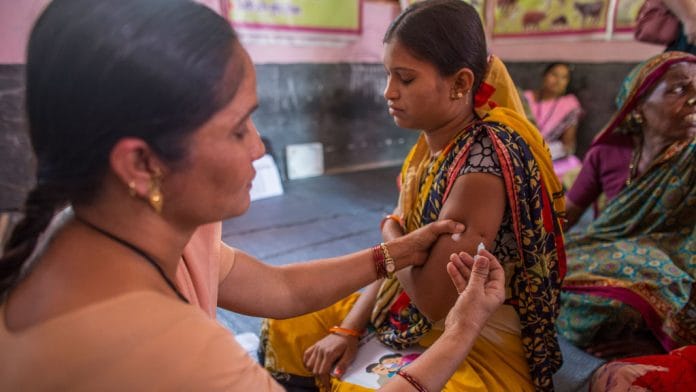Government plans to set up a national governing council comprising Centre and state representatives, on the lines of the GST Council.
New Delhi: The Narendra Modi government’s ambitious ‘Ayushman Bharat’ programme – a major component of which is the National Health Protection Scheme (NHPS) – may hit a political roadblock. Many states run their own health insurance schemes, and some are refusing to shell out an additional 40 per cent funds required for implementing the project.
While West Bengal Chief Minister Mamata Banerjee publicly announced that the state may opt out of the scheme, stating that her government had already enrolled 50 lakh people under its health insurance scheme ‘Swasthya Sathi’, many other states are demanding a co-branding of their existing health insurance schemes along with the NHPS.
‘Centre will take the credit’
Currently, 24 states run their own health protection schemes using different models. Sources across different state governments told ThePrint that they are apprehensive that if their existing health insurance schemes are brought under the NHPS ambit, the central government will walk away with the credit for implementing the biggest ever pan-India health insurance scheme.
“It is therefore pertinent to co-brand the ongoing state-specific health insurance schemes if they are to be integrated with the NHPS, else the non-BJP ruled states may have a problem,” a senior official from one of the states said.
States are also unsure if they will be able to shell out the massive amount of money required as part of their share for the scheme. Several state officials say they have already made budget allocations for the upcoming financial year, and it would be an additional burden to make extra budgetary allocations for the scheme at such a short notice. Usually, the revised budget estimates are made in January.
The premium for the scheme has been calculated at Rs 1,082 per family per year for a health cover of Rs 5 lakh, of which the states are to pay 40 per cent.
The scheme aims at covering 10 crore poor and vulnerable families by providing a health package of Rs 5 lakh per family on a floating basis. The scheme is expected to benefit about 50 crore people.
Discussions with states
The issues were recently discussed in a video conference of state health secretaries organised by the Ministry of Health and Family Welfare, and will be further deliberated upon in a two-day national consultation on the scheme on 16 and 17 February.
Six working groups— comprising officials of the NITI Aayog, insurance companies and other experts — have been formed. Their presentations will be put up during the national consultation for further discussion.
The NITI Aayog and the ministry have set up an ambitious deadline of 15 August 2018 to roll out the NHPS.
Implementation plan
States have been asked to decide on the trust or insurance mode of implementing the scheme, identify a state health agency, and set up a district-level structure to implement the scheme and carry out Aadhaar-seeding socio-economic caste census (SECC) data for targeted families.
The states have also been asked to decide on converging state health schemes and chalk out a comprehensive, region-specific Information Education and Communication (IEC) strategy, along with a call centre or helpline by March.
They have also been given deadlines, such as identifying SECC beneficiaries and organising gram sabhas by March, finalising insurance companies by May, and empanelling hospitals by June, before inviting tenders by July.
On its part, the Centre is also planning to set up a national governing council comprising central and state government representatives to encourage cooperative federalism, likely to be on the lines of the Goods and Services Tax Council.
Finance minister Arun Jaitley had said that the Centre and states need to work together under institutions like the GST Council for implementing NHPS.
It has also been proposed to set up state-level governing councils with representatives from individual states.






